2023 prize-winner: Emilie CHESSEL
Emilie CHESSEL was named the 16th prize-winner of the SILAB - Jean PAUFIQUE Corporate Foundation.
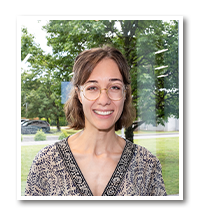 The project of Emilie CHESSEL is entitled “Study of metabolic and translational adaptations leading to melanoma resistance to immunotherapy”. This work will be carried out in the Mediterranean center of Molecular Medicine (C3M, INSERM U11065 Eq12, Nice University) under the direction of ROCCHI and CEREZO doctors.
The project of Emilie CHESSEL is entitled “Study of metabolic and translational adaptations leading to melanoma resistance to immunotherapy”. This work will be carried out in the Mediterranean center of Molecular Medicine (C3M, INSERM U11065 Eq12, Nice University) under the direction of ROCCHI and CEREZO doctors.
The melanoma, at metastatic stage, is one of the cancers with the highest mortality rate. Although immunotherapy has revolutionized the treatment of many cancers, the majority of patients fail to respond or develop resistance. Adaptations in cellular metabolism play a major role in the intrinsic mechanisms responsible for this resistance. Preliminary studies have demonstrated deregulation of the metabolism of arginine, a semi-essential amino acid, in melanoma cells resistant to immunotherapy. In addition, they identified an increase in the ASS1 enzyme, involved in arginine synthesis. The aim of this project is to understand how increased synthesis of this amino acid contributes to the resistance of melanoma cells to immunotherapy. This will enable us to identify new biomarkers and/or new therapeutic targets in order to offer an alternative to patients with cutaneous melanoma who have reached a therapeutic impasse.
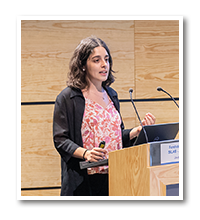
2022 prize-winner: Anna LLEBARIA FABRIAS
The project of Anna LLEBARIA FABRIAS is entitled
“Influence of enzyme IL4I1 on the microbiota during melanoma development and on the response to an anti-PD1 antibody”. This work will be carried out in the Institut Cochin (INSERM U1016, CNRS UMR 8104, University of Paris-Cité) in Paris under the direction of Dr. Armelle PREVOST-BLONDEL (IL4I1 et melanoma) jointly with Dr. Benoit CHASSAING (Microbiota of mucus membranes and chronic inflammatory diseases). This project is intended to determine the influence of the bactericidal enzyme IL4I1 on the composition of the intestinal and cutaneous microbiota in a model of spontaneous metastatic melanoma in mice. Using
in vivo and
in vitro approaches, the group will investigate the contribution of bacteria in tumor development and resistance to immunotherapies, and will attempt to identify bacteria with antitumor activity. The results of this work could lead to proposing new strategies based on modulating the microbiota in order to boost the efficacy of anti-PD1 antibodies in patients suffering from cutaneous melanoma.
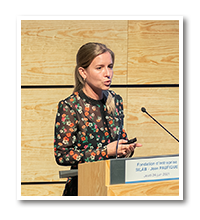
2021 prize-winner: Léa Dousset
Dr.
Léa Dousset’s project is entitled
“Therapeutic targeting by cell profiling of aggressive forms of Squamous cell carcinoma (SCC)”. Her work was conducted in INSERM unit U1035 at the University of Bordeaux under the direction of Dr. Hamid Rezvani (dermatology and cancer team, BMGIC). This project involved a series of patients presenting an aggressive form of SCC and a precancerous lesions. Its goal was to use spatial transcriptomics to identify the cell composition and types, their phenotypes and their differences, by comparing the precancerous lesion and the aggressive form. Access to patient biopsies was made possible by the MITOSKIN translational study conducted in the Dermatology Department of Prof. Beylot-Barry at the Bordeaux University Hospital. Sub-populations were profiled using single cell RNA sequencing. The better understand of the architecture of tumors and the factors promoting tumor progression could result in the identification of new prognostic and diagnostic biomarkers. This approach may also open the path to new therapeutic targets.
Previous prize-winner
2020 prize-winner: Aïda MEGHRAOUI-KHEDDAR and Solène BESSON
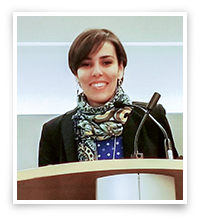 Aïda MEGHRAOUI-KHEDDAR was awarded for her CARSINO research project “CARcinomes cutanés, Suppression Immunitaire et neuronesNOcicepteurs : vers une nouvelle cible thérapeutique en oncodermatologie/Cutaneous carcinomas, immune suppression and nociceptor neurons: towards a new therapeutic target in oncodermatology”. The studies were conducted at the Institute of Molecular and Cellular Pharmacology, CNRS UMR 7275 and the Université Côte d'Azur in Nice, in the “Regulation of immune responses at muco-cutaneous sites” group, co-directed by Dr. Véronique BRAUD and Dr. Fabienne ANJUERE. The goal of the CARSINO project is to conduct an exhaustive and integrative characterization of the tumor environment of epidermoid cutaneous carcinomas in order to define interactions between nociceptor nerves and suppressive immune cells infiltrating recurrent and inoperable tumors. This will identify predictive biomarkers of these recurrences as well as new therapeutic strategies to stop tumor progression tumorale.
Aïda MEGHRAOUI-KHEDDAR was awarded for her CARSINO research project “CARcinomes cutanés, Suppression Immunitaire et neuronesNOcicepteurs : vers une nouvelle cible thérapeutique en oncodermatologie/Cutaneous carcinomas, immune suppression and nociceptor neurons: towards a new therapeutic target in oncodermatology”. The studies were conducted at the Institute of Molecular and Cellular Pharmacology, CNRS UMR 7275 and the Université Côte d'Azur in Nice, in the “Regulation of immune responses at muco-cutaneous sites” group, co-directed by Dr. Véronique BRAUD and Dr. Fabienne ANJUERE. The goal of the CARSINO project is to conduct an exhaustive and integrative characterization of the tumor environment of epidermoid cutaneous carcinomas in order to define interactions between nociceptor nerves and suppressive immune cells infiltrating recurrent and inoperable tumors. This will identify predictive biomarkers of these recurrences as well as new therapeutic strategies to stop tumor progression tumorale.
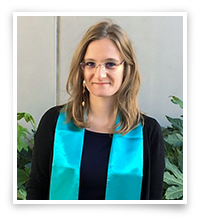 The research project of Solène BESSON is entitled “Développement de vecteurs d’immunothérapies pour le traitement du mélanome/Development of vectors of immunotherapies for the treatment of melanomas”. This work is being done at the Institute of Structural Biology in collaboration with the Établissement Français du Sang/French Blood Institute and the Institute for Advanced Biosciences in Grenoble in the “Adenovirus” and “Immunobiologie et Immunothérapies dans les maladies chroniques/Immunobiology and Immunotherapies in chronic diseases” groups directed by Dr. Pascal FENDER. The research involves the development and preclinical evaluation of new vectors of immunotherapies that stimulate the patient’s immune system to effectively combat melanomas.
The research project of Solène BESSON is entitled “Développement de vecteurs d’immunothérapies pour le traitement du mélanome/Development of vectors of immunotherapies for the treatment of melanomas”. This work is being done at the Institute of Structural Biology in collaboration with the Établissement Français du Sang/French Blood Institute and the Institute for Advanced Biosciences in Grenoble in the “Adenovirus” and “Immunobiologie et Immunothérapies dans les maladies chroniques/Immunobiology and Immunotherapies in chronic diseases” groups directed by Dr. Pascal FENDER. The research involves the development and preclinical evaluation of new vectors of immunotherapies that stimulate the patient’s immune system to effectively combat melanomas.
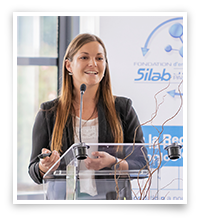
2019 prize-winner: Marine CORDONNIER
Her EXOMEL project is dedicated to
“understanding, treating and monitoring melanoma by studying exosomes”. The studies are conducted in the Lipids, Nutrition, and Cancer Center - LNC - INSERM UMR 866 Faculty of Medicine of Dijon, under the supervision of Prof. Carmen GARRIDO, Director of the Research Center and Head of the heat shock protein (HSP)-Pathies” team and Dr Jessica GOBBO. The goal of this project is to evaluate
in vivo the efficacy of a combination of treatments aiming both at inhibiting the immunosuppression undertaken by the immune system and at preventing the release of carcinoma cells by this latter. The second aim of this research work consists in the assessment of the potential use of plasma exosomes as biomarkers for predicting the response to the immunotherapeutic treatments in patients suffering from melanoma. As a result, the objective of this innovative project is to increase the anti-tumor efficacy of immunotherapies on the one hand and to improve the selection of the most suitable patients to benefit from this kind of treatment on the other hand, in order to optimize patient care towards a more personalized medicine.
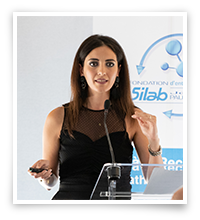
2018 prize-winner: Joudi BAKAR
The K~SyLAB project (Keratinocytes - Lipid Synthesis and Alterations of the Barrier) is dedicated to the
“Diagnosis of the pathological cutaneous barrier: multimodal approach of the lipid biosynthesis on cellular models”. Her studies are conducted within the Interdisciplinary Academic Unit Lip(Sys)
2: Lipids, analytical and biological Systems, attached to the university of Paris-Sud, faculty of pharmacy, under the supervision of Prof. Arlette Baillet-Guffroy and Mrs Rime Michael-Jubeli. The K~SyLAB project, at the crossroads of physical chemistry/biology, deals with the development of targeted analytical methods, enabling the successful observation and understanding of the biological processes of the lipid synthesis within the keratinocytes to form the cutaneous barrier. The data will be generally processed with various chemometrics treatments whose performance will be compared. This innovative model would lead to new diagnosis tools allowing to establish a “molecular link” between an abnormality at the lipid biosynthesis level and symptoms from a cutaneous pathology.
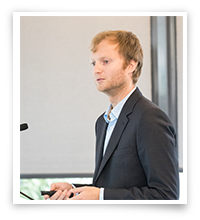
2017 prize-winner: Thomas BERTERO
The project chosen focuses on “the influence of mechanical properties of the tumoral niche on the Squamous Cells Carcinoma metabolism”. His research is carried out at the Institute for Research on Cancer and Aging (IRCAN) in Nice, under the supervision of Dr. Cédric GAGGIOLI, in charge of the “interactions between the tumors and the stroma of invasive cancers” team. This project is aiming at understanding the metabolic interactions between the Carcinoma-Associated Fibroblasts (CAFs) and the Squamous Cells Carcinoma (SCCs) in response to the physicochemical signals of the extracellular matrix. This research work is becoming a major stake in the discovery of new anti-metastatic therapeutic targets for the cure of patients suffering from cutaneous cancer in order to limit the adverse effects of conventional anti-cancer treatments.
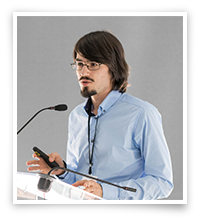
2016 prize-winner: Jonas OGIEN
The project chosen focuses on
« Microscopy by high-resolution, augmented-contrast optical coherence for non-invasive diagnosis of skin cancer ». His research will be carried out at the Charly Fabry Laboratory in Palaiseau, part of the Optical Institute Graduate School, under the supervision of Arnaud Dubois, Professor in charge of the « Biomedical Imaging Systems » team. The objective of the project is to develop an optical imaging system with the capacity to produce similar images to the histological images currently used to diagnose skin cancer, in an non-invasive way (without a biopsy) and in real time. Additional imaging methods (angiography and polarimetry) will also be included in the system to improve the sensitivity and specificity of the diagnosis of early-stage tumors.
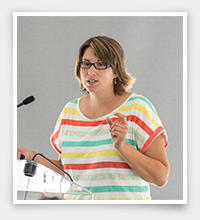
2015 prize-winner: Laure GIBOT
The project that was selected is dedicated to
« Electroporation associated to calcium to treat melanoma ». The research works are carried out in the Institute of Phamacology and Structural Biology in Toulouse, within the Marie-Pierre ROLS team, research director in charge of the Cellular Biophysical team.
Research is organized around the use of calcium (better safety profile, easily accessible and inexpensive) as a substitute for conventional anticancer drugs. The results could be useful to determine if the electroporation associated to calcium can become a treatment of interest in the fight against melanoma, both in industrialized countries and in developing ones.
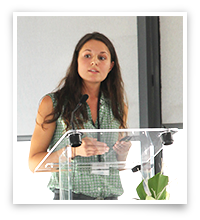
2014 prize-winner: Laura CAU
The research project that was retained is dedicated to
« Importance of the desimination in the epidermal homeostasis ».
The works are carried out in the UDEAR-CNRS unit, University of Toulouse, in the Dr Michel SIMON team who is known worldwide as specialist of the desimination study in the skin, and conducted by Pr Guy SERRE. Dr Michel SIMON and Pr Hidenari TAKAHARA, University of Ibaraki in Japan, are the co-directors of this project.
Research is organized around the importance of peptidyl-arginine desiminases (PADs) in the epidermal homeostasis. The work will be able to determine if PADs is involved in atopic dermatitis and/or psoriasis. The results obtained could be useful to better understand the implication of PADs in the carcinogenesis.
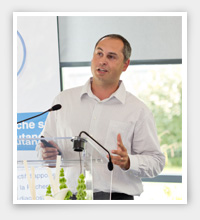
2013 prize-winner: Yann CHELI
The research project that was retained is dedicated to
"Methylation of histones and melanoma initiating cells (MIC): towards a new therapeutic approach."
The works are carried out at the Mediterranean Centre for Molecular Health (C3M - Centre Méditerranéen de Médecine Moléculaire), INSERM U1065 team 1 in Nice, in the laboratory "Biology and pathology of melanocytic cells: from skin pigmentation to melanomas," conducted by Dr. Robert BALLOTTI.
Research is organized around the study of the role of histones methylation in the mechanisms of gene regulation of stem cells in the tumor cells, validation as potential biomarkers in the progression of the disease as well as the determination of possible new therapeutic targets.
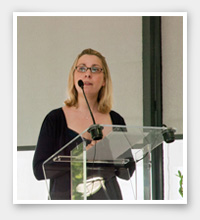
2012 prize-winner: Laëtitia DOUGUET
The research project is entitled
"The prognostic value of myeloid cells in skin melanoma and myeloid infiltrate modeling in response to chemotherapy".
The research work is conducted within the Cochin Institute in Paris, INSERM U1016, in the immunohematology department, within the team "Study of the immune response and its regulation in melanoma", under the direction of Ph.D Armelle PRÉVOST-BLONDEL.
The focus of the research is the study of interactions between the immune system and melanoma cells, as well as the assessment of the impact of chemotherapy and new biotherapies on the immune environment.
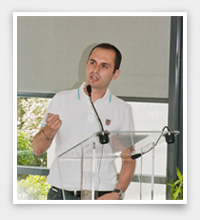
2011 prize-winner: Carmelo LUCI
Ph.D in molecular and cellular aspects in biologyThe research project of the laboratory is entitled
"Cutaneous carcinomas and immunity system: stimulation of the anti-tumor properties of the natural killer cells and dendritic cells"..
The research work is conducted within the Institute of Molecular Pharmacology - UMR 6097, at the University of Nice Sophia-Antipolis, in the team "regulation of immune responses to muco-cutaneous sites" under the joint supervision of PhD Fabienne ANJUERE and PhD Véronique BRAUD.
The research results expect to allow the identification of cellular and molecular mechanism that are involved in the development of skin cancer lesions and offer new approaches of immunotherapy against this type of cancer.
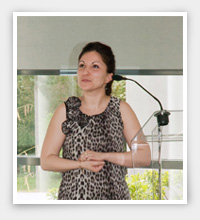
2010 prize-winner: Yasmine TOUIL
Ph.D in pharmacology/cancerology The research project of the laboratory is entitled
"role of inflammatory factors in the activation of melanoma tumor stem cells. Therapeutic implications"..
The research work is conducted in the molecular and cellular targeting for cancer treatment group of the INSERM U837 Unit, at the Jean-Pierre Aubert centre in Lille, under the supervision of Renata POLAKOWSKA.
The work is aimed to provide knowledge about melanoma and open the way to new therapeutic approaches.
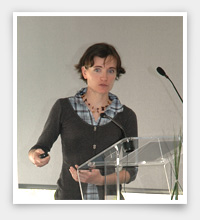
2009 prize-winner: Caroline ASPORD
Ph.D in Immunology and associate professor of biochemistry and biological engineeringThe TherapDC project
consists in understanding the role of pDCs in the development and control of melanoma in order to define new anti-tumor therapeutic strategies.
The research work is realized at the EFS/INSERM U823 R&D laboratory, in the cancer immunobiology and immunotherapy unit, under the direction of Doctor Joël PLUMAS.
The project, conducted in close collaboration with the dermatology department of Grenoble university hospital, should lead to better knowledge of the immunology of melanoma, enabling new therapeutic targets to be defined, and to the transfer of an innovative cell therapy protocol highly-promising.
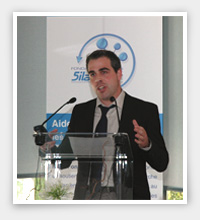
2008 prize-winner: Juan GARCÍA VALERO
The research project is intituled:
"Study of the mechanism of insertion membrane proteins of the family Bcl-2 and conception of poropeptides© anti-cancer / anti-angiogenic". It is called POROS (from the Greek ΠΟΡΟΣ and means, in the figurative sense, an effective way to by pass a difficulty).
The research work were conducted under the scientific supervision of the Dr. A. AOUACHERIA, researcher at the CNRS, at the "Institut de Biologie et de Chimie des Protéines" of Lyon within the team «Apoptose et Oncogenèse» headed by Pr. G. GILLET.
This project appear to open up highly promising paths of research in the field of cutaneous carcinogenesis.
 The project of Emilie CHESSEL is entitled “Study of metabolic and translational adaptations leading to melanoma resistance to immunotherapy”. This work will be carried out in the Mediterranean center of Molecular Medicine (C3M, INSERM U11065 Eq12, Nice University) under the direction of ROCCHI and CEREZO doctors.
The project of Emilie CHESSEL is entitled “Study of metabolic and translational adaptations leading to melanoma resistance to immunotherapy”. This work will be carried out in the Mediterranean center of Molecular Medicine (C3M, INSERM U11065 Eq12, Nice University) under the direction of ROCCHI and CEREZO doctors. 

 Aïda MEGHRAOUI-KHEDDAR was awarded for her CARSINO research project “CARcinomes cutanés, Suppression Immunitaire et neuronesNOcicepteurs : vers une nouvelle cible thérapeutique en oncodermatologie/Cutaneous carcinomas, immune suppression and nociceptor neurons: towards a new therapeutic target in oncodermatology”. The studies were conducted at the Institute of Molecular and Cellular Pharmacology, CNRS UMR 7275 and the Université Côte d'Azur in Nice, in the “Regulation of immune responses at muco-cutaneous sites” group, co-directed by Dr. Véronique BRAUD and Dr. Fabienne ANJUERE. The goal of the CARSINO project is to conduct an exhaustive and integrative characterization of the tumor environment of epidermoid cutaneous carcinomas in order to define interactions between nociceptor nerves and suppressive immune cells infiltrating recurrent and inoperable tumors. This will identify predictive biomarkers of these recurrences as well as new therapeutic strategies to stop tumor progression tumorale.
Aïda MEGHRAOUI-KHEDDAR was awarded for her CARSINO research project “CARcinomes cutanés, Suppression Immunitaire et neuronesNOcicepteurs : vers une nouvelle cible thérapeutique en oncodermatologie/Cutaneous carcinomas, immune suppression and nociceptor neurons: towards a new therapeutic target in oncodermatology”. The studies were conducted at the Institute of Molecular and Cellular Pharmacology, CNRS UMR 7275 and the Université Côte d'Azur in Nice, in the “Regulation of immune responses at muco-cutaneous sites” group, co-directed by Dr. Véronique BRAUD and Dr. Fabienne ANJUERE. The goal of the CARSINO project is to conduct an exhaustive and integrative characterization of the tumor environment of epidermoid cutaneous carcinomas in order to define interactions between nociceptor nerves and suppressive immune cells infiltrating recurrent and inoperable tumors. This will identify predictive biomarkers of these recurrences as well as new therapeutic strategies to stop tumor progression tumorale.
 The research project of Solène BESSON is entitled “Développement de vecteurs d’immunothérapies pour le traitement du mélanome/Development of vectors of immunotherapies for the treatment of melanomas”. This work is being done at the Institute of Structural Biology in collaboration with the Établissement Français du Sang/French Blood Institute and the Institute for Advanced Biosciences in Grenoble in the “Adenovirus” and “Immunobiologie et Immunothérapies dans les maladies chroniques/Immunobiology and Immunotherapies in chronic diseases” groups directed by Dr. Pascal FENDER. The research involves the development and preclinical evaluation of new vectors of immunotherapies that stimulate the patient’s immune system to effectively combat melanomas.
The research project of Solène BESSON is entitled “Développement de vecteurs d’immunothérapies pour le traitement du mélanome/Development of vectors of immunotherapies for the treatment of melanomas”. This work is being done at the Institute of Structural Biology in collaboration with the Établissement Français du Sang/French Blood Institute and the Institute for Advanced Biosciences in Grenoble in the “Adenovirus” and “Immunobiologie et Immunothérapies dans les maladies chroniques/Immunobiology and Immunotherapies in chronic diseases” groups directed by Dr. Pascal FENDER. The research involves the development and preclinical evaluation of new vectors of immunotherapies that stimulate the patient’s immune system to effectively combat melanomas.











